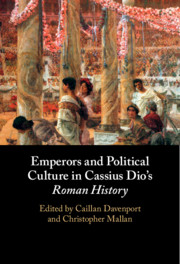Book contents
- Emperors and Political Culture in Cassius Dio’s Roman History
- Emperors and Political Culture in Cassius Dio’s Roman History
- Copyright page
- Contents
- Figures
- Contributors
- Preface
- Abbreviations
- Introduction Cassius Dio
- I Imperial and Political Narratives
- Chapter 1 Vox populi, vox mea? Information, Evaluation and Public Opinion in Dio’s Account of the Principate
- Chapter 2 News, Rumour, and the Political Culture of the Roman Imperial Monarchy in the Roman History
- Chapter 3 Literary and Documentary Sources in Dio’s Narrative of the Roman Emperors
- Chapter 4 ‘Now Comes the Greatest Marvel of All!’ (79[78].8.2)
- II Emperors and Biographies
- III Political Groups and Political Culture
- IV Reception and Reflection
- Bibliography
- Index
Chapter 1 - Vox populi, vox mea? Information, Evaluation and Public Opinion in Dio’s Account of the Principate
from I - Imperial and Political Narratives
Published online by Cambridge University Press: 23 July 2021
- Emperors and Political Culture in Cassius Dio’s Roman History
- Emperors and Political Culture in Cassius Dio’s Roman History
- Copyright page
- Contents
- Figures
- Contributors
- Preface
- Abbreviations
- Introduction Cassius Dio
- I Imperial and Political Narratives
- Chapter 1 Vox populi, vox mea? Information, Evaluation and Public Opinion in Dio’s Account of the Principate
- Chapter 2 News, Rumour, and the Political Culture of the Roman Imperial Monarchy in the Roman History
- Chapter 3 Literary and Documentary Sources in Dio’s Narrative of the Roman Emperors
- Chapter 4 ‘Now Comes the Greatest Marvel of All!’ (79[78].8.2)
- II Emperors and Biographies
- III Political Groups and Political Culture
- IV Reception and Reflection
- Bibliography
- Index
Summary
Dio in his imperial narrative has a distinctive technique of evaluating emperors, based on how he saw the informational constraints of the monarchical state. He tends to frame his assessments of emperors as descriptions of how they were perceived by contemporaries rather than as his own unique insights into how they ‘really’ were. This chapter applies James C. Scott's concept of ‘public transcripts’ and ‘hidden transcripts’ to Dio’s methodological statements and then his narrative of the Julio-Claudian, Flavian and Antonine emperors. Dio is a self-consciously acute and skeptical observer of the performance of imperial power and the reception of that performance by contemporary observers. This for him is a major component of what historiography exists to record in an environment where the actual realities of power politics cannot be fully known or discussed. The chapter concludes by looking at how this narrative stance changes in Dio’s contemporary narrative, in which he is a personal witness, but the emperors are youthful figureheads, whose performances become ever more detached from either the realities of politics or the experience of the senatorial aristocracy.
- Type
- Chapter
- Information
- Publisher: Cambridge University PressPrint publication year: 2021

